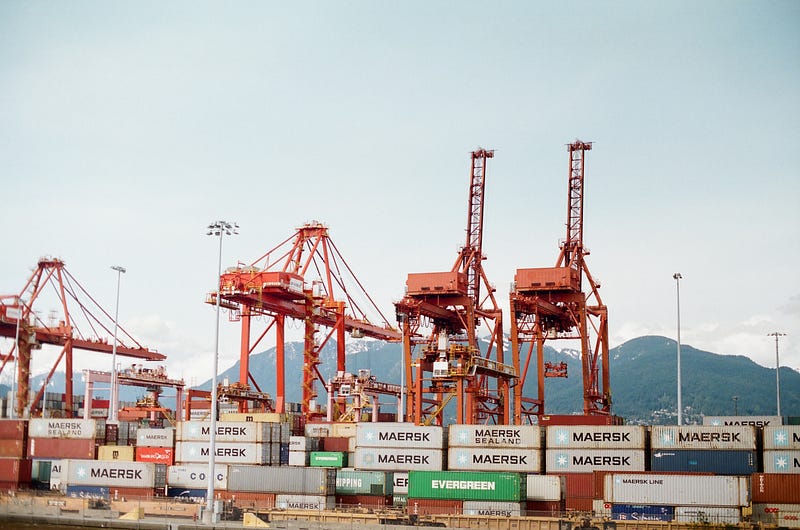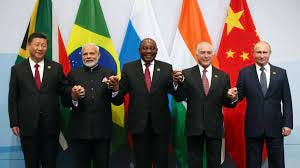Sanctions Shatter Supply Chains While Millions Starve

The great famine has begun. People are starving in Asia and Africa and going hungry in the Americas. This famine, and the looming Super-Depression of which it is part, are not naturally caused. Yes, there are droughts and floods, but people have found food despite natural disasters before. People are dying from lack of money, not lack of food.
How did we get here? After World War 2, the USA led the way to an economy the world had never seen. Instead of countries meeting their own needs and trading with each other for things they couldn’t produce, the US, UK, and big banks worked toward a global economy. In the new order, there would be no national economies, only one world economy. Countries were encouraged to produce only what they could export and to rely on imports for most of their needs.
Over 75 years, most of the world was forced or lured into an export-import global economy. If leaders resisted, they could be persuaded, replaced, or killed, as well-documented by former persuader John Perkins in Confessions of An Economic Hitman. The Empire set up international lending institutions such as the International Monetary Fund (IMF) and the World Bank to help countries “develop” their export capacity and to punish them if they spent too much on social welfare or internal development.
Focus on exports by governments in the global South allowed the imperial countries to exploit colonial labor and resources more efficiently. They enrich local oligarchs and modernize things like roads and cars, but they sink countries in debt and make people dependent on the US-led Empire, which neither knows nor cares anything about them. Under this system, the human economy as a whole grew larger and richer (at Nature’s expense) and came increasingly under US dominance.
Some countries resisted:: Russia, China, Cuba, Iran, Venezuela, Serbia, Libya, Iraq, Zimbabwe and a few others. But most of the time, the superior military force and productive powers of global capitalism won the battles.
As the economy grew more global, supply chains grew longer and more complicated. A machine might be made of materials from five or six countries in the global South, be assembled someplace else, transported and sold to a rich country. Globalism was complicated, but telecommunications via the Internet and transportation via trucks, ships, and planes kept it humming.
But now, after forcing the world into this global economy, globalists have decided to tear it apart. I don’t know why — perhaps they value their dominance more than their profit — but they are dismantling global capitalism, leaving billions to scramble for the basic necessities of life.
Sanctions shatter supply chains
The Empire talks about free markets, but now they mostly work to shut markets down. Having provoked Russia into a military incursion in Ukraine, the US, the European Union (EU,) and US-allied countries in the Pacific (Japan, New Zealand, Australia) attacked Russia with the most extreme sanctions regime ever imposed. They shut down completed natural gas pipelines and pulled all their businesses out of Russia. Western shipping companies wouldn’t ship Russian goods. In the White House’s own words, they sought to “turn Russia into a pariah,” to cut them out of the world economy.
They kicked Russia out of the Society for Worldwide Interbank Financial Telecommunications (SWIFT), electronic funds transfer system, making it extremely hard for other countries to buy Russian stuff. Senegal’s President Macky Sall, head of the African Union said, “When the SWIFT system is disrupted, it means that even if produce exists, payment for it becomes difficult or even impossible,”
Countries around the world suddenly found themselves cut off from Russian exports on which they depended. Senegal was already poor, but now their people go hungry while grain rots because it can’t be sold or shipped.
President Sall said, “The sanctions against Russia have worsened our situation. Now we have no access to grain from Russia. And we have no access to fertilizers, creating a threat to food security in Africa.”
Note that the sanctions on Russia have hurt those who impose them more than they hurt Russia. For lack of energy from Russia, European businesses are cutting way back; energy prices are way up throughout the US-led Empire. But they hurt the poor countries more.
As Sri Lankan pundit Indrajit Samarajiva says “Sanctions are an act of war, and they have turned a local invasion into a global catastrophe.”.
Sanctions on Russia are not a one-off. They have become a way of life for the US Empire, now imposing blockades and trade restrictions on at least 25 countries around the world, according to Investopedia. US sanctions often go beyond trade restrictions to outright theft. They robbed $7 billion Afghan banks held in US-connected banks, for no other offense than successfully resisting US occupation of their country. Now they can’t buy food or medicines and the result is mass starvation. The US and UK confiscated about $2 billion in gold belonging to the Venezuelan government, which also had broken no international laws. Many of their people have now joined the ranks of the starving.
Targeted countries are those politically opposed to the Empire’s domination, but sanctions usually expand to include countries and companies that trade with the original target. Fear of these “secondary sanctions” can shut down wide sections of international trade. They take a wrecking ball to the world economy. But what happens to the people?
Having been forced to rely on exports and imports to live, what happens to people when that trade is cut off? How can anyone trust a US-dominated system that might turn on them and take their savings at any moment? Global capitalism has been history’s greatest bait-and-switch — join our system or else, then watch us shut it down — and people desperately need an alternative.

There is another system
In 2009, leaders of Russia, China, Brazil, India and South Africa announced the formation of the BRICS alliance to find alternatives to US dominance. Although two of those governments, in Brazil and India, have since been replaced by fascistic leaders, they haven’t completely abandoned BRICS or resigned to US unipolar dominance.
Historian and analyst Vijay Prasad of the Tricontinental Institute for Social Research says,“BRICS wants internationalization, to see multinational organizations like the UN strengthened. NATO/US wants world domination.” BRICS is expected to expand soon to include Iran and Argentina. Together, they may have enough clout to create an economy that can survive outside the global economy that is rapidly being dismantled.
Russian President Vladimir Putin announced in June that BRICS was developing a new international reserve currency to compete with the US dollar, a combination of their national currencies backed by real products and resources. According to Putin, they are also developing an alternative to SWIFT for currency transfers. After decades of US-dominated globalism, the global South seems close to creating a new system that could enable all countries to cooperate and compete equally.
We’ll see if the BRICS plan comes to fruition. I hope that it does, because the Empire’s system is creating starvation. Samarajiva wrote from Sri Lanka, “I’m telling you from a people that have already fallen, famine is spreading like a contagion, and no one will escape unscathed.”
Impact on Earth
One caveat here — we don’t know why our rulers are doing this. Could they have realized that industrial civilization is unsustainable and be tearing it apart to save themselves? Nature would be far better off without the industry, the pollution, the shipping, the wars. Could a BRICS-led world stop the destruction of our living world?
It seems unlikely, doesn’t it?. Brazil’s government is burning down the Amazon as fast as it can. China’s Belt and Road Initiative looks as though it will help the global South develop their economies, but is economic development necessarily a good thing for plants and animals and people who live there, if it means deforesting the jungles and polluting the rivers?
Starting as I do from focus on mother Earth, I know we must transition to small-scale local economies in which communities provide for themselves and take care of each other and of our world. Can a system like China’s, in which capitalists operate under tight control of an authoritarian party, give us prosperity and still help the planet heal?
Maybe, maybe not, but I am absolutely sure the capitalists who globalized the economy and are now tearing it down care nothing about Earth or anyone on it other than themselves. This crisis is an opportunity. Maybe if we work, fight, and speak out with enough intelligence, courage, and love, a new BRICS-led world could undo the damage globalism has wrought.
— — —
Thanks for reading! Please comment, share, or steal. Follow me on Twitter, on Facebook or on Medium.com Hire me for freelancing, editing, or tutoring on Linked In
